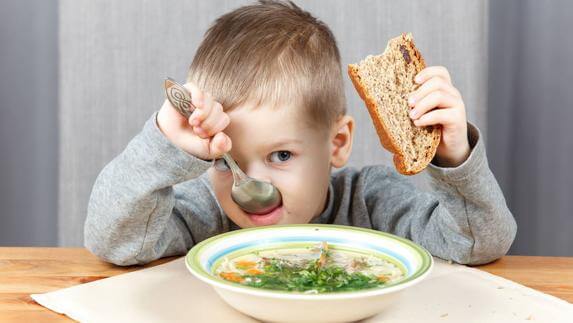3 Reasons Why You Shouldn't Force Your Children To Eat

Specialist recommend that babies should start eating solid foods after the age of 6 months. This new stage is known as an introduction to complementary feeding. However, it is not always easy for your children to get used to these new flavors.
The process of getting babies to eat new foods requires a lot of patience on our part. This happens because we take it as our duty. Somehow we have become convinced that “they should” start eating solid foods. As a result, some parents force their children to eat.
Sometimes, mothers are interested in this topic because they want to stop breastfeeding. The problem with this, however, is that babies are not usually in a rush to try new foods. We all know how complicated it can be to make them eat. This makes feeding time the most difficult moment of the day.
Why you shouldn’t force your children to eat
All the “little airplanes” and “chuchu-trains” we have to clean up from the floor show how difficult it is to help children get used to complementary feeding. Although it is true that they need to incorporate more nutrients in their diet, it is also not convenient to force them.
If the pediatrician told you that it’s time for your child to start eating cereals and vegetables, it doesn’t mean that it’s going to happen overnight. It is important for us to let them eat their way – everything else is an unnecessary obligation.

Complementary feeding is just that, a complement. It does not mean that we should substitute their whole diet all at once. It means that we should add a few new elements.
A common mistake parents make is to start feeding their child the same food adults eat. They believe that if they don’t do so, their child is going to miss out on necessary nutrients, and this is also a mistake.
Here are some of the reasons why we shouldn’t force our children to eat:
Daily requirements according to their age.
Sometimes pediatricians recommend a specific amount of food a day. However, this measurement can fail for many different reasons. One reason is that food concentration can vary, for example you could make very diluted porridge or it could be concentrated.
Also, if a child doesn’t end up eating everything, it is hard to calculate how much the child still needs to eat. In addition, if you don’t take into account the breast milk you are feeding your child, you might overfeed them. All babies are different, and they have different daily requirements.
According to studies, the approximate nutrition requirements are as follows:
- 6-month old girl approximately 819kcal, boy’s maximum 779kcal
- A 9-month old girl requires about 859kcal maximum. Boys require up to 924kcal
- 1-year-old girls need between 500-1000 kcals, while boys of the same age require 479-1169kcal.
- 18 month old children require approximately 1200 kcal
- 24 month old children require about 1300kcal maximum for boys and 1273kcal for girls
Complementary foods are complementary

If we obligate our children to eat complementary foods as their main diet, we can alter their concentration of nutrients. This can be harmful to their health.
“Everything that is eaten without needs is stolen from the stomach of the poor”– Mohandas Gandhi
It is true that babies need extra nutrients, however, their nutritional needs grow progressively. The child’s gender also plays an important role in how much kcals are needed.
Sometimes we make the mistake of forcing them to eat more than necessary. For example, two children of the same age do not necessarily need to eat the same amount. We also make the mistake of comparing our children with their little brother or friend who eats more.
Breast milk should remain as the main food in their diet. Purees, porridges etc. are complementary. It doesn’t matter if they want to eat or not. They know exactly how much they need to eat, so they should not be forced.
If solid foods are not their thing
However appealing the recipe may seem, babies are still not familiar with solid foods. They also don’t know how to eat them; they don’t know anything about spoons or cups. All they know is their mother’s breasts. The process of adaptation is slow and we should try not to rush them.
It is recommended that we allow children to discover new foods that you make in their own way. Before they decide to eat whatever it is you prepared, they should feel comfortable and confident in what they see on their plate. They should be allowed to analyze the food with their hands and they should be given time to relate to the new smells.
It can be useful to let them experiment with whole foods, instead of crushed foods. You can give them fruits cut in the form of small sticks. You can also give them a whole vegetable. It is important that they don’t feel pressured when it comes time to eat. If they do not want to eat at the moment, it is not a problem.
Offering them foods can also be a way to get them to try new things. Ask them if they want a piece of fruit, if they want to touch it or maybe taste it. Their taste will develop over time and not from one day to another.
There are some foods that they will simply not like and nobody should be obligated to eat something they don’t like. Try to put yourself in their shoes.
All cited sources were thoroughly reviewed by our team to ensure their quality, reliability, currency, and validity. The bibliography of this article was considered reliable and of academic or scientific accuracy.
- Mascola, A. J., Bryson, S. W., & Agras, W. S. (2010). Picky eating during childhood: a longitudinal study to age 11 years. Eating behaviors, 11(4), 253-257. https://www.sciencedirect.com/science/article/abs/pii/S1471015310000528
- Bailey, L. (2018). Parents: Think twice before you pressure your picky eater. University of Michigan News. https://news.umich.edu/parents-think-twice-before-you-pressure-your-picky-eater/
- Salvador, G., & Manera, M. (2018). Acompañar las comidas de los niños y las niñas: consejos para comedores escolares y para las familias. Infancia: educar de 0 a 6 años, (170), 34-39. https://scientiasalut.gencat.cat/bitstream/handle/11351/1986/acompanyar_apats_infants_2016_cas.pdf?sequence=2
- De Gracia, M., Marcó, M., & Trujano, P. (2007). Factores asociados a la conducta alimentaria en preadolescentes. Psicothema, 646-653. https://reunido.uniovi.es/index.php/PST/article/view/8530/8394
- Ramos Méndez, R. J., & Sánchez Valencia, A. M. (2018). Propuesta de cocina creativa para favorecer la nutrición de niños entre 4 a 7 años a partir del consumo de alimentos naturales. https://repository.unab.edu.co/handle/20.500.12749/11877
This text is provided for informational purposes only and does not replace consultation with a professional. If in doubt, consult your specialist.








